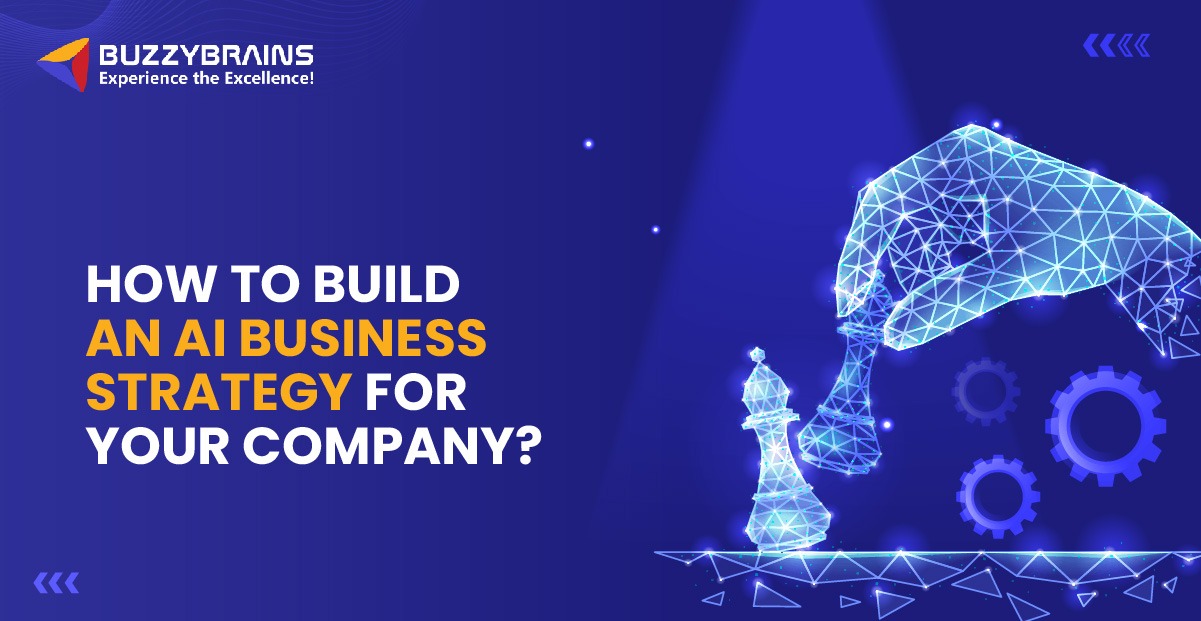How to Build an AI Business Strategy for Your Company?

Artificial Intelligence (AI) is transforming the way businesses operate. Companies are leveraging AI to enhance efficiency, improve customer experiences, and drive innovation. However, to maximize AI’s potential, businesses need a well-defined AI strategy.
Building an AI strategy is not just about implementing technology. It requires a structured approach to align AI initiatives with business goals. This guide will help you understand how to create an AI strategy tailored to your company’s needs.
- What is the Role of AI in Business?
- Why Do Companies Need to Build an AI Business Strategy?
- How to Build an AI Business Strategy for Your Company?
- Challenges in Creating an AI Business Strategy
- FAQs About AI Business Strategy Creation
- Conclusion
- Maximize ROI with AI – Partner with BuzzyBrains for Smarter Solutions!
What is the Role of AI in Business?
AI is reshaping industries by automating processes, analyzing data, and enabling smarter decision-making. Businesses across various sectors are using AI to improve operations and gain a competitive edge.
Here are some key roles AI plays in business:
- Process Automation – AI automates repetitive tasks, reducing manual effort and increasing productivity.
- Data Analysis – AI-powered tools analyze vast amounts of data to uncover insights and patterns.
- Customer Experience Enhancement – AI chatbots, recommendation systems, and voice assistants improve customer interactions.
- Risk Management – AI helps detect fraud, predict risks, and enhance cybersecurity.
- Predictive Analytics – AI-driven forecasting helps businesses make informed decisions.
AI is no longer a luxury but a necessity for companies looking to stay ahead in the digital era.
Why Do Companies Need to Build an AI Business Strategy?
AI adoption is growing rapidly. However, without a clear strategy, businesses may face challenges in implementing AI effectively. Here’s why an AI strategy is crucial:
1. Align AI with Business Goals
A strategy ensures AI investments support business objectives, such as improving customer service or optimizing supply chains.
2. Maximize ROI
AI initiatives require investment. A well-planned strategy ensures resources are used efficiently to deliver the best return on investment.
3. Address Ethical and Compliance Issues
AI raises concerns about data privacy, security, and bias. A strategy helps businesses address these issues while staying compliant with regulations.
4. Overcome Implementation Challenges
AI adoption requires infrastructure, skilled talent, and change management. A strategy provides a roadmap to tackle these challenges effectively.
5. Ensure Scalability and Sustainability
A structured AI approach ensures solutions can scale with business growth and remain relevant in the long run.
How to Build an AI Business Strategy for Your Company?
Building an AI business strategy requires a structured approach. Simply adopting AI without a clear plan can lead to wasted resources and failed implementations. A well-designed AI strategy aligns AI initiatives with business goals, ensures smooth integration, and maximizes return on investment (ROI).
Follow this step-by-step guide to create an effective AI business strategy for your company.
Step 1: Identify Business Objectives
Before implementing AI, define your business goals. AI should serve a clear purpose rather than being implemented just for the sake of using advanced technology.
Ask yourself:
- Do you want to automate repetitive tasks?
- Are you looking to improve customer experience?
- Do you need better data insights for decision-making?
- Are you aiming to reduce operational costs?
Clearly defining objectives helps you choose the right AI applications that align with your business needs.
Step 2: Assess Your Data Readiness
AI depends on high-quality data. Without clean, structured, and relevant data, AI models may produce inaccurate or biased results.
Evaluate your company’s data readiness by considering:
- Data Availability – Do you have enough data to train AI models?
- Data Quality – Is the data accurate, structured, and relevant?
- Data Storage & Management – Do you have the necessary infrastructure to store and process large datasets?
- Data Security & Privacy – Are you complying with data regulations like GDPR or CCPA?
If your data isn’t ready, invest in data collection, cleaning, and structuring before moving forward with AI.
Step 3: Explore AI Use Cases in Your Industry
AI has diverse applications, and different industries benefit from AI in unique ways. Identifying the most relevant AI use cases for your business helps you focus your efforts.
Some common AI applications by industry:
- Retail & E-Commerce – Personalized recommendations, chatbots, demand forecasting.
- Healthcare – Predictive diagnostics, AI-driven drug discovery, robotic surgeries.
- Finance & Banking – Fraud detection, AI-powered customer support, algorithmic trading.
- Manufacturing – Predictive maintenance, quality control automation, supply chain optimization.
- Marketing & Advertising – AI-driven content generation, customer segmentation, automated ad targeting.
Analyze how AI can solve your company’s pain points and create new opportunities.
Step 4: Choose the Right AI Technologies
AI is an umbrella term that includes multiple technologies. Select the right AI tools based on your objectives.
Key AI technologies include:
- Machine Learning (ML) – AI learns from data and improves over time, useful for automation and predictive analytics.
- Natural Language Processing (NLP) – Helps machines understand human language for chatbots, voice assistants, and sentiment analysis.
- Computer Vision – AI recognizes objects and patterns in images and videos, used in facial recognition, quality inspection, and medical imaging.
- Robotic Process Automation (RPA) – AI automates repetitive tasks, reducing manual labor in administrative processes.
Choosing the right AI technology ensures better alignment with business needs and maximizes efficiency.
Step 5: Build an AI Team or Partner with Experts
AI implementation requires skilled professionals. Depending on your company’s expertise, you can either:
- Build an In-House AI Team – Hire data scientists, AI engineers, and business analysts to develop AI solutions internally.
- Partner with AI Vendors – Collaborate with AI development companies that provide ready-made AI solutions tailored to your needs.
- Use AI-as-a-Service (AIaaS) Platforms – Leverage cloud-based AI solutions like AWS AI, Google AI, or IBM Watson to access AI tools without extensive development efforts.
If your company lacks AI expertise, partnering with specialists can accelerate implementation and ensure better results.
Step 6: Develop AI Models and Test Them
Once you choose an AI application, the next step is developing AI models. This involves:
- Data Collection & Preparation – Feeding the AI system with relevant, structured data.
- Model Training – Training the AI model using machine learning techniques.
- Testing & Validation – Running tests to evaluate model accuracy and effectiveness.
- Fine-Tuning & Optimization – Adjusting parameters to improve AI performance.
Testing AI models in a controlled environment ensures they function correctly before full-scale deployment.
Step 7: Integrate AI into Business Operations
After successful testing, AI solutions should be integrated into existing business workflows. A smooth integration process includes:
- Aligning AI with Existing Systems – Ensure AI solutions work seamlessly with your current software and infrastructure.
- Training Employees – Educate employees on how to use AI tools effectively.
- Change Management – Address resistance to AI adoption by demonstrating its benefits and providing necessary support.
Integration is crucial to ensure AI enhances productivity rather than disrupting operations.
Step 8: Monitor AI Performance and Optimize Continuously
AI models require continuous monitoring to ensure they perform efficiently. Key performance metrics include:
- Accuracy & Reliability – Is AI providing accurate insights and results?
- User Engagement & Satisfaction – Are employees and customers benefiting from AI tools?
- Operational Efficiency – Is AI improving business processes and reducing costs?
AI should be refined over time based on performance data, feedback, and evolving business needs.
Step 9: Address Ethical Considerations
AI raises ethical concerns such as bias, privacy, and security risks. Companies must take proactive steps to ensure responsible AI use.
Key ethical considerations:
- AI Transparency – Clearly explain how AI models work and make decisions.
- Bias Mitigation – Ensure AI does not produce biased or discriminatory results.
- Data Privacy – Follow strict data protection policies to safeguard user information.
- Regulatory Compliance – Adhere to AI-related laws and industry regulations.
A responsible AI strategy builds trust with customers and stakeholders.
Step 10: Scale AI Initiatives for Long-Term Growth
Once AI proves successful in one department, it can be expanded across other business functions. Scaling AI involves:
- Investing in Scalable AI Infrastructure – Cloud computing and AI platforms make scaling easier.
- Expanding AI Use Cases – Explore new AI applications beyond initial implementation.
- Staying Updated with AI Trends – AI evolves rapidly, so businesses must keep pace with emerging innovations.
A long-term AI strategy ensures sustainable business growth and innovation.
By following these steps, businesses can develop a robust AI strategy that drives growth and innovation.
Challenges in Creating an AI Business Strategy
Despite its benefits, AI implementation comes with challenges. Here are some common hurdles:
- Lack of AI Expertise – Finding skilled AI professionals is challenging.
- High Implementation Costs – AI solutions require significant investment.
- Data Privacy and Security Risks – Managing sensitive data requires strong security measures.
- Integration with Legacy Systems – Many businesses struggle to integrate AI with existing infrastructure.
- AI Bias and Ethical Concerns – AI models may produce biased results if not designed properly.
- Unclear ROI – Measuring the return on AI investments can be difficult.
Overcoming these challenges requires careful planning and expert guidance.
FAQs About AI Business Strategy Creation
Q1. What are the common AI use cases for businesses?
AI is used for customer service chatbots, fraud detection, predictive analytics, and supply chain optimization. Industries like healthcare, finance, and retail are leveraging AI for automation and data-driven insights.
Q2. How can AI help in data-driven decision-making?
AI analyzes vast amounts of data to uncover patterns and trends. It helps businesses make informed decisions based on accurate insights rather than assumptions.
Q3. What are the key components of an AI business strategy?
An AI strategy includes business goal alignment, data readiness, AI technology selection, implementation roadmap, risk management, and performance monitoring.
Q4. How do I measure the success of my AI strategy?
Measure AI success using key performance indicators (KPIs) such as cost savings, efficiency improvements, customer satisfaction, and revenue growth.
Q5. What are the latest trends in AI business strategy?
Emerging trends include AI-powered automation, ethical AI, personalized AI-driven marketing, and AI in cybersecurity. Businesses are also focusing on explainable AI for transparency.
Conclusion
AI is revolutionizing the business landscape. However, to leverage AI effectively, companies need a well-structured strategy. A successful AI strategy aligns with business goals, ensures data readiness, and addresses challenges like implementation costs and ethical concerns.
By following a step-by-step approach, businesses can integrate AI seamlessly and maximize its benefits. The future belongs to AI-driven enterprises, and those who embrace AI strategically will gain a competitive edge.
Maximize ROI with AI – Partner with BuzzyBrains for Smarter Solutions!
Building an AI strategy can be complex, but you don’t have to do it alone. At BuzzyBrains, we help businesses develop and implement AI solutions that drive results.
- AI consulting tailored to your business needs
- End-to-end AI strategy development
- Expert guidance for seamless AI integration
Get a free consultation today and start your AI journey with confidence!

